六年级英语-一般将来时
六年级英语-一般将来时(含练习题)
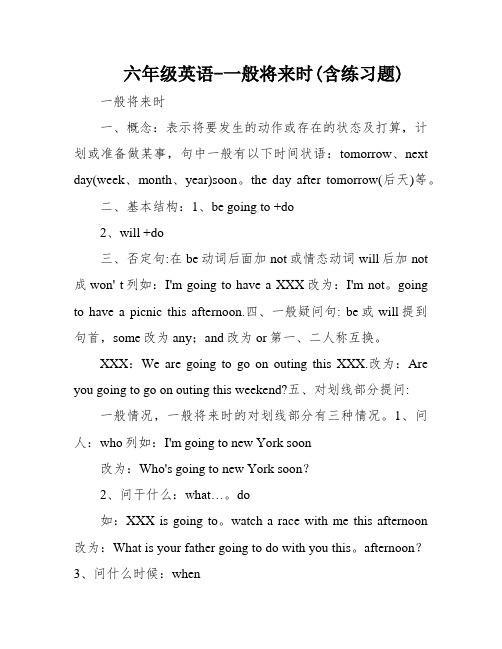
六年级英语-一般将来时(含练习题)一般将来时一、概念:表示将要发生的动作或存在的状态及打算,计划或准备做某事,句中一般有以下时间状语:tomorrow、next day(week、month、year)soon。
the day after tomorrow(后天)等。
二、基本结构:1、be going to +do2、will +do三、否定句:在be动词后面加not或情态动词will后加not 成won' t列如:I'm going to have a XXX改为:I'm not。
going to have a picnic this afternoon.四、一般疑问句: be或will提到句首,some改为any;and改为or第一、二人称互换。
XXX:We are going to go on outing this XXX.改为:Are you going to go on outing this weekend?五、对划线部分提问: 一般情况,一般将来时的对划线部分有三种情况。
1、问人:who列如:I'm going to new York soon改为:Who's going to new York soon?2、问干什么:what…。
do如:XXX is going to。
watch a race with me this afternoon 改为:What is your father going to do with you this。
afternoon?3、问什么时候:when列如:She's going to go to bed at nine 改为:When is going to bed?六、同义句:。
六年级英语一般将来时讲解加练习
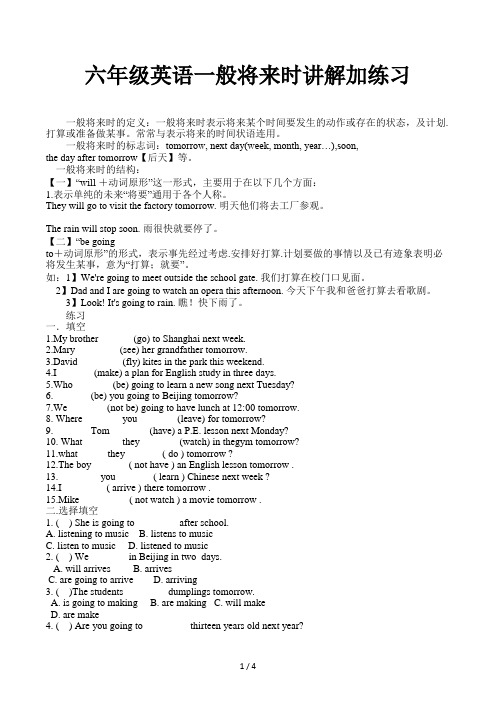
六年级英语一般将来时讲解加练习一般将来时的定义:一般将来时表示将来某个时间要发生的动作或存在的状态,及计划.打算或准备做某事。
常常与表示将来的时间状语连用。
一般将来时的标志词:tomorrow, next day(week, month, year…),soon,the day after tomorrow【后天】等。
一般将来时的结构:【一】“will +动词原形”这一形式,主要用于在以下几个方面:1.表示单纯的未来“将要”通用于各个人称。
They will go to visit the factory tomorrow. 明天他们将去工厂参观。
The rain will stop soon. 雨很快就要停了。
【二】“be goingto+动词原形”的形式,表示事先经过考虑.安排好打算.计划要做的事情以及已有迹象表明必将发生某事,意为“打算;就要”。
如:1】We're going to meet outside the school gate. 我们打算在校门口见面。
2】Dad and I are going to watch an opera this afternoon. 今天下午我和爸爸打算去看歌剧。
3】Look! It's going to rain. 瞧!快下雨了。
练习一.填空1.My brother ______ (go) to Shanghai next week.2.Mary ________ (see) her grandfather tomorrow.3.David ________ (fly) kites in the park this weekend.4.I_______ (make) a plan for English study in three days.5.Who _______ (be) going to learn a new song next Tuesday?6._______ (be) you going to Beijing tomorrow?7.We _______ (not be) going to have lunch at 12:00 tomorrow.8. Where _______ you _______ (leave) for tomorrow?9._______ Tom _______ (have) a P.E. lesson next Monday?10. What _______ they _______ (watch) in thegym tomorrow?11.what _____ they _______( do ) tomorrow ?12.The boy _______( not have ) an English lesson tomorrow .13.________ you _______( learn ) Chinese next week ?14.I ________ ( arrive ) there tomorrow .15.Mike _________ ( not watch ) a movie tomorrow .二.选择填空1. ( ) She is going to ________ after school.A. listening to musicB. listens to musicC. listen to musicD. listened to music2. ( ) We _______ in Beijing in two days.A. will arrivesB. arrivesC. are going to arriveD. arriving3. ( )The students ________ dumplings tomorrow.A. is going to makingB. are makingC. will makeD. are make4. ( ) Are you going to_________ thirteen years old next year?A. will beB. areC. beD. go5. ( ) ___will see a play in 5 days?A. WhenB. WhatC. WhoD. Whose6. ( ) Mary______ English next year.A. will learnB. will to learnC. are going to learn.D. learns7. ( ) He’ll _____ shopping this afternoon.A. goingB. goC. goesD. went8. ( ) Will you ____ at the bus stop at 10:30?A. meetingB. meetsC. meetD. met9. ( ) Lily and I _______ the guitar. next week.A. am going to playB. are going to playC. will playsD. play10. ( ) How ______ Jenny ___ home tomorrow?A. does......goB. is……goingC. will……goD. do……g o11. ( ) Who is going to _________ a song ?A. sings B singing C. to sing D. sing12. ( ) I _________in Beijing in three days.A. are going to arriveB. arriveC. will arriveD. arrives13. ( ) He _______some model planes tomorrow .A. going to makeB. is makingC. will make D makes14. ( ) Are you going to ___________a doctor next year ?A. will beB.. areC. beD. are going to15. ( ) She ________ you make supper this evening .A. helpsB. will helpC. is helpingD. is going help三.把下列句子变成一般疑问句,并给出肯定和否定回答。
六年级英语下册知识讲义-一般将来时以及情态动词can-人教版(五四学制)

一、学习目标1. 能够基本把握一般将来时的相关构成及用法。
2. 基本上能够理解情态动词can的两大用法。
二、重点、难点1. 一般将来时be going to 和will 之间的区别和联系。
2. 情态动词can在不同语境中的含义分析。
三、考情分析这两点在中考试题中都是非常重要的知识点,可以说每年都有所考查。
单选题、完成句子题都有它们的身影,而且在阅读和完形题中也会存在。
1. 一般将来时的概念及相关用法【教材原句】What are you going to do at the weekend? 你周末打算做什么?【概念】be going to do表示自己打算做某事、计划做某事或有意做某事。
【结构】主语+ be going to + do在变句练习中我们应该注意这里面存在的是be动词的变化。
根据“情助be实”四步变句法,应该在be动词上面进行变化。
We are going to have a picnic.We are not going to have a picnic.Are we going to have a picnic?Yes, we are. /No, we aren’t.当然,如果我们到了初二,学习了不定式的用法,此种结构实际上可以理解为be going 加上一个动词不定式结构。
【用法1】表示主体现在打算在最近或将来要做的某事。
这种打算往往是事先就已经考虑好了的。
【例句】My sister is going to learn German next month.我妹妹下个月起要学习德语。
My friend is going to stay for a week.我的朋友准备待一个星期。
【用法2】表示说话人根据已经有了的迹象来推断某件事情极有可能发生。
【例句】Look at the black clouds! It’s going to rain!看那些乌云,要下雨了。
【拓展】大家应该注意到的是,be going to也可以用来讨论自己对于未来状态的一种计划。
人教版六年级英语上册知识点归纳 Unit3一般将来时的表达方法

一般将来时的五种表达方法一般将来时1)am/is/are/going to + do和will/shall + doshall用于第三人称单数,常被will 所代替,二者都可以缩写成'll。
will 在陈述句中用于各人称,在征求意见时常用于第二人称。
Which paragraph shall I read first.Will you be at home at seven this evening?2) be going to +动词原形或地点,表示将来。
a. 主语的意图,即将做某事。
What are you going to do tomorrow?b. 计划,安排要发生的事。
The play is going to be produced next month。
c. 有迹象要发生的事。
Look at the dark clouds, there is going to be a storm.3) be +不定式表将来,按计划或正式安排将发生的事。
We are to discuss the report next Saturday.4) be about to +不定式,意为马上做某事。
He is about to leave for Beijing.注意:be about to 不能与tomorrow, next week 等表示明确将来时的时间状语连用。
一般将来时1.一般将来时的基本概念一般将来时表示将来某一时刻的动作或状态,或将来某一段时间内经常的动作或状态。
一般将来时由助动词shall(第一人称),will(第二、三人称)+动词原形构成。
美国英语则不管什么人称,一律用will。
2.一般将来时的形式●will 常简略为'll,并与主语连写在一起,如:I'll,he'll,it'll,we'll,you'll,they'll。
一般将来时(课件)人教PEP版英语六年级下册

时间状语
tomorrow 系列: tomorrow morning tomorrow afternoon tomorrow evening the day after tomorrow at 7:00 tomorrow morning
next 系列:
next time
next day
next week
A. are going B. are going to C. is going to
( C )3. We are going to cook some fish _____.
A. yesterday
B. last night
C. next weekend
( A )4. _____ you _____ TV every day?
A. Do; watch
B. Are; watching
C. Did; watch
( B )5. He _____ films tomorrow evening.
A. is watching B. is going to watch
C. watched
( C )6. Look!The girls _____ on the bridge over there.
一、一般将来时的用法 一般将来时表示将来某一时刻的动作或状态,或将来某一段 时间内要发生的动作或事情。 时间标志词:this afternoon, this evening, tomorrow, tomorrow+ 时间, the day after tomorrow, next+time/day/week/year … 等。 如: It is going to rain tomorrow. 明天将会下雨。
六年级英语一般将来时的语法总结及练习
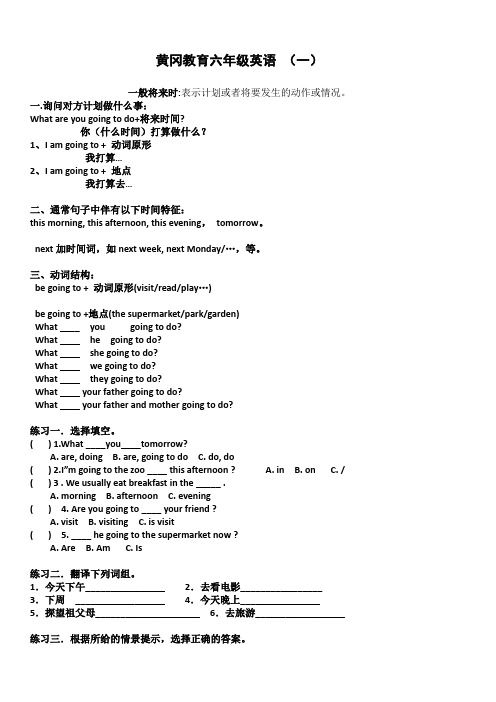
黄冈教育六年级英语(一)一般将来时:表示计划或者将要发生的动作或情况。
一.询问对方计划做什么事:What are you going to do+将来时间?你(什么时间)打算做什么?1、I am going to + 动词原形我打算…2、I am going to + 地点我打算去…二、通常句子中伴有以下时间特征:this morning, this afternoon, this evening,tomorrow。
next加时间词,如next week, next Monday/…,等。
三、动词结构:be going to + 动词原形(visit/read/play…)be going to +地点(the supermarket/park/garden)What ____ you going to do?What ____ he going to do?What ____ she going to do?What ____ we going to do?What ____ they going to do?What ____ your father going to do?What ____ your father and mother going to do?练习一.选择填空。
( ) 1.What ____you____tomorrow?A. are, doingB. are, going to doC. do, do( ) 2.I”m going to the zoo ____ this afternoon ? A. in B. on C. / ( ) 3 . We usually eat breakfast in the _____ .A. morningB. afternoonC. evening( ) 4. Are you going to ____ your friend ?A. visitB. visitingC. is visit( ) 5. ____ he going to the supermarket now ?A. AreB. AmC. Is练习二.翻译下列词组。
六年级英语一般将来时单选题40题
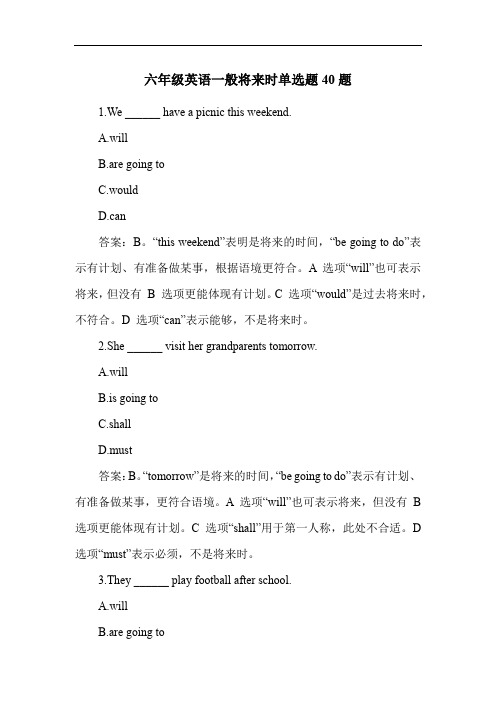
六年级英语一般将来时单选题40题1.We ______ have a picnic this weekend.A.willB.are going toC.wouldD.can答案:B。
“this weekend”表明是将来的时间,“be going to do”表示有计划、有准备做某事,根据语境更符合。
A 选项“will”也可表示将来,但没有B 选项更能体现有计划。
C 选项“would”是过去将来时,不符合。
D 选项“can”表示能够,不是将来时。
2.She ______ visit her grandparents tomorrow.A.willB.is going toC.shallD.must答案:B。
“tomorrow”是将来的时间,“be going to do”表示有计划、有准备做某事,更符合语境。
A 选项“will”也可表示将来,但没有B 选项更能体现有计划。
C 选项“shall”用于第一人称,此处不合适。
D 选项“must”表示必须,不是将来时。
3.They ______ play football after school.A.willB.are going toC.mayD.should答案:B。
“after school”表示将来的时间,“be going to do”表示有计划、有准备做某事,更符合语境。
A 选项“will”也可表示将来,但没有B 选项更能体现有计划。
C 选项“may”表示可能,不是将来时。
D 选项“should”表示应该,不是将来时。
4.I ______ buy a new book next week.A.willB.am going toC.canD.might答案:B。
“next week”表示将来的时间,“be going to do”表示有计划、有准备做某事,更符合语境。
A 选项“will”也可表示将来,但没有B 选项更能体现有计划。
C 选项“can”表示能够,不是将来时。
一般将来时讲解及练习六年级

一般将来时标志词:tomorrow,thedayaftertomorrow,nextweek,intwoyears,soon,threedayslater等结构一:willwill可用于所有人称,shall只用于第一人称I和we肯定形式:主+willdo一般疑问:will+主+do否定形式:主+won’tdo特殊疑问:what/when/where/which+will+主+doeg:1.we knowtheresultsoon.我们很快就会知道结果了;2.we knowtheresultsoon.我们不会很快就知道结果的;3. we knowtheresultsoon.我们将会很快就知道结果吗4. weknowtheresult.我们将在什么时候知道结果结构二:begoingto肯定形式:主+begoingto+do一般疑问:be+主+goingto+do否定形式:主+benotgoingto+do特殊疑问:what/when等+be+主+goingto+doeg:skyisfullofblackclouds.Itto .快要下雨了;2.ButIthinkit rain.但我觉得它不会下雨;3.it soon很快就会下雨了吗4. you to tomorrow明天你要干什么小小区别:通常情况下will和begoingto能互换will,shall多习惯用于表示是否愿意,第一人称作主语的疑问句一般用shall不用willbegoingto则多用于表示根据迹象判断将要发生某事,或者计划打算要做的事eg:1.youdrivetoschooltomorrowwemeetat8:00tomorrowattheblackcloudsIt rain.readsomebookinthelibrarythisafternoon.用现在进行时bedoing表示将来时:go,come,leave,arrive等表示位置转移的动词eg:1.UncleWang come.王叔叔就要来了;2.They leaveforBeijing.他们即将前往北京;一般将来时练习一.连词成句并按要求改变句式注意动词的正确形式1、children,at,study,home,will,on,computer,inthefuture肯定陈述句:一般疑问句:2、back,they,month,later,a,get,will肯定陈述句:否定句:一般疑问句:3、he,is,going,a,to,patty,evening,this肯定陈述句:否定句:一般疑问句:特殊疑问句问时间:4. China is a modern and strong country.in twenty years5. Do you study hardfrom now on二、用括号中词的适当形式填空1、Thebus come.Pleasewaitforaminute.2、Guangzhou 将会morebueatifulYes,3、Howyou spentyouwinterholiday4、Peoplehavelessworktodointhefuture.5、we goouttomorrowifit rain三、选择正确的答案1. Thereanimportantmeetingnextweek.A.willbeB.willhaveC.willhasD.willgoingtobe2. toEnglandtomorrow.A.flyB.flewC.isflyingD.flies3. Marywillcomebackfiveo’ter4. yougototheparktomorrowA.WillB.ShallC.DoD.Are5. . The day after tomorrow they ________ a volleyball match.A. will watchingB. watchesC. is watchingD. is going to watch6. .There ________ a birthday party this Sunday.A. shall beB. will beC. shall going to beD. will going to be7. They ________ an English evening next Sunday.A. are havingB. are going to haveC. will havingD. is going to have8. ________ you ________ free next Sunday A. Will; areB. Will; be C. Do; be D. Are; be9. He ________ there at ten tomorrow morning. A. willB. Is C. will beD. be10. ________ your brother ________ a magazine from the libraryA. Are; going to borrowB. Is; going to borrowC. Will; borrowsD. Are; going to borrows作业:一、单项选择;1. There __________ a meeting tomorrow afternoon.A. will be going toB. will going to beC. is going to beD. will go to be2. Charlie ________ here next month.A. isn’t workingB. doesn’t workingC. isn’t going to workingD. won’t work3. He ________ very busy this week, he ________ free next week.A. will be; isB. is; isC. will be; will beD. is; will be4. There ________ a dolphin show in the zoo tomorrow evening.A. wasB. is going to haveC. will haveD. is going to be5.–________ you ________ free tomorrow – No. I ________ free the day after tomorrow.A. Are; going to; willB. Are; going to be; willC. Are; going to; will beD. Are; going to be; will be6. Mother ________ me a nice present on my next birthday.A. will givesB. will giveC. givesD. give7. – Shall I buy a cup of tea for you–________. 不,不要;A. No, you won’t.B. No, you aren’. No, please don’t.D. No, please.8. – Where is the morning paper – I ________ if for you at once.A. getB. am gettingC. to getD. will get二、动词填空;1. I ______leavein a minute. I ______finishall my work before I ______ leave.2. —How long _____ you _____studyin our country—I _____planto be here for about one more year.—What ______ you ______doafter you ______leavehere—I ______returnhome and ______geta job.3. I ______betired. I ______goto bed early tonight.4. Mary’s birthday is next Monday, her mother _____giveher a present.三、句型转换;1. People in the north often go skating in winter. next winter2. There are two cinemas in that town. next year3. He comes back late.in two days4.She is a conductor of a train.soon。
六上英语一般将来时,现在进行时,一般现在时,情态动词规则
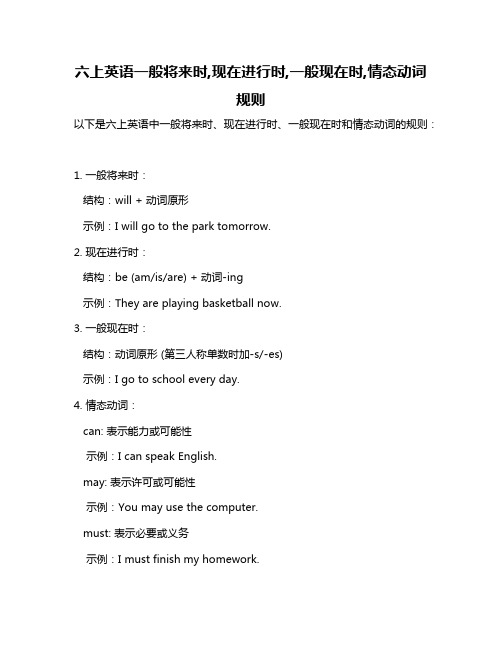
六上英语一般将来时,现在进行时,一般现在时,情态动词
规则
以下是六上英语中一般将来时、现在进行时、一般现在时和情态动词的规则:
1. 一般将来时:
结构:will + 动词原形
示例:I will go to the park tomorrow.
2. 现在进行时:
结构:be (am/is/are) + 动词-ing
示例:They are playing basketball now.
3. 一般现在时:
结构:动词原形 (第三人称单数时加-s/-es)
示例:I go to school every day.
4. 情态动词:
can: 表示能力或可能性
示例:I can speak English.
may: 表示许可或可能性
示例:You may use the computer.
must: 表示必要或义务
示例:I must finish my homework.
shall: 表示建议或命令
示例:You shall stay out of the garden.
will: 表示意愿或将来时间
示例:I will help you.
这些规则是英语语法中的基础部分,需要不断练习和巩固。
如需更多信息,建议查阅语法书籍或咨询英语教师。
小学六年级英语一般将来时四个句型

一、肯定句——主语+ be +going to do主语+will dobe动词包括:am,are,is例. I am going to play football tomorrow. 我明天将要踢足球。
I will play football tomorrow.=I plan to play football tomorrow.He is going to watch TV tomorrow morning. 他明天早上打算看电视。
He will watch TV tomorrow morning.=He plans to watch TVtomorrow morning.She is going to visit her teacher next week. 她下周要去探望她老师。
She will visit her teacher next week.=She plans to visit her teacher next week.练习:1.他今晚计划读书。
二、否定句——主语+be +not +going to do主语+will +not +do例.I am not going to play football tomorrow.I will not going to play football tomorrow.He is not going to watch TV tomorrow morning.He will not watch TV tomorrow morning.练习:三、一般疑问句——Be +主语+going to doWill +主语+do提示:一般疑问句就是把肯定句中的be和will放在句首例.Are you going to play football tomorrow?Will you play football tomorrow?Is he going to watch TV tomorrow morning?Will he watch TV tomorrow morning?Is she going to visit her teacher next week?Will she visit her teacher next week?练习:四、特殊疑问句——疑问词+be +主语+going to do疑问词+will +主语+do疑问词包括:what,when,how,where,why提示:特殊疑问句=疑问词+一般疑问句——先确定用哪个疑问词例.What are you going to do tomorrow? What will you do tomorrow?When are you going to watch TV? When will you watch TV?Where are you going tomorrow? Where will you go tomorrow?Why is she going to visit her teacher? Why will she visit her teacher?。
人教版六年级上册英语语法《一般将来时》

1、定义:表示在将来时间里打算干的事情。 2、句型结构: 人称主语+ be going to + 动词原形+ (时间)
e.g. 1、I’m going to buy some books tonight. 2、we are going to clean our classroom tomorro 3、She is going to go shopping . 4、John is going to play chess with Mike. 5、They are going to the cinema this evening.
在将来时中,要注意区分几个疑问词 的用法:
What When Where How 什么 (提问事情) 什么时候 (提问时间) 哪里 (提问地点) 怎样 (提问方式)
请认真观察答句,根据答句写出问句。
What are you going to do tomorrow? 1\ __________________________________ We are going to take a trip tomorrow. What is Sarah going to buy? 2\ __________________________________ Sarah is going to buy a comic book . Where are they going this evening? 3\ __________________________________ They are going to the cinema this evening. When is Mike going to the park? 4\ __________________________________ Mike is going to the park next week. 5\ __________________________________ How are you going to the zoo? I’m going to the zoo by bike. Are you going to read books tonight? 6\ _________________________________ Yes, I am going to read books tonight. Is she going to play football after school? 7\ _________________________________ No, she is going to play basketball after school. Do you go there by bus? 8\ __________________________________ No, I go there on foot.
六年级-小学英语-一般将来时

2. Where(询问地点) 例: Where are you going this evening? 今天晚上你打算去哪里? I am going to the bookstore. 我打算去书店。
3. when(询问时间) 例: When are you going to buy the book? 你打算什么时候去买书? I am going at 5 o'clock. 我打算5点钟去。
is
is
+动词原形
“be going to + 动词原形”表将来 构成一般将来时态,表示计划要做的事或根据目 前推测将要发生的动作,意为“打算,将要”
I am going to buy a book. He is going to read a book. She is going to take a look. We are going to take a trip. They are going to play football.
I ______ going to …. You ________ going to …
are
am
He _______ going to …
She ______going to …
is Jack _______ going to … are My parents ______ going to … are Jack and Tom ________going to …
3.一般疑问句:Be+主语+going to+动词原形+将
来时间?
例:Are they going to read a book tonight ?
句型转换。 1.Mike is going to play football
六年级英语一般将来时句型单选题40题

六年级英语一般将来时句型单选题40题1.We will go to the park tomorrow.A.go to the zooB.go to schoolC.stay at home答案:A。
本题中“We will go to the park tomorrow.”表示明天我们将去公园。
选项A 是去动物园,与去公园不同的活动地点,符合一般将来时的不同活动计划;选项B 去学校和题干去公园活动地点不同,但不是日常活动计划的比较;选项C 待在家里与去公园活动方式不同,也不是日常活动计划的比较。
2.I will read a book after dinner.A.watch TVB.do homeworkC.play games答案:B。
“I will read a book after dinner.”表示晚饭后我将读书。
选项B 做作业与读书都是学习相关活动,符合一般将来时的日常活动计划;选项A 看电视与读书活动性质不同;选项C 玩游戏与读书活动不同。
3.They will visit their grandparents next week.A.visit friendsB.go shoppingC.study at home答案:A。
“They will visit their grandparents next week.”下周他们将看望祖父母。
选项 A 看望朋友与看望祖父母都是社交活动,符合一般将来时日常活动计划;选项B 去购物活动不同;选项C 在家学习与看望祖父母活动不同。
4.She will sing a song at the party.A.danceB.tell a storyC.draw a picture答案:B。
“She will sing a song at the party.”她将在聚会上唱歌。
选项B 讲故事与唱歌都是在聚会上的表演活动,符合一般将来时日常活动计划;选项A 跳舞与唱歌活动不同;选项C 画画与唱歌活动不同。
(完整版)小学英语一般将来时练习
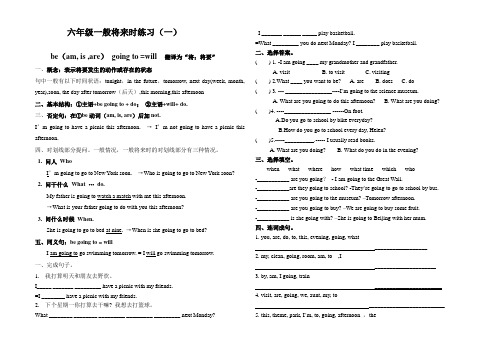
六年级一般将来时练习(一)be(am, is ,are)going to =will 翻译为“将;将要”一、概念:表示将要发生的动作或存在的状态句中一般有以下时间状语:tonight,in the future,tomorrow, next day(week, month, year),soon, the day after tomorrow(后天),this morning,this afternoon二、基本结构:①主语+be going to + do;②主语+will+ do.三、否定句:在①be动词(am, is, are)后加not.I’m going to have a picnic this afternoon. →I’m not going to have a picnic this afternoon.四、对划线部分提问。
一般情况,一般将来时的对划线部分有三种情况。
1. 问人WhoI’m going to go to New York soon. →Who is going to go to New York soon? 2. 问干什么What …do.My father is going to watch a match with me this afternoon.→What is your father going to do with you this afternoon?3. 问什么时候When.She is going to go to bed at nine. →When is she going to go to bed?五、同义句:be going to = willI am going to go swimming tomorrow. = I will go swimming tomorrow.一、完成句子。
1. 我打算明天和朋友去野炊。
I_____ _______ _________ have a picnic with my friends.=I ________ have a picnic with my friends.2. 下个星期一你打算去干嘛? 我想去打篮球。
六年级英语一般将来时句子及翻译

六年级英语一般将来时句子及翻译1、我明天要去上学。
I will go yo school tomorrow。
2、明天谁将要来那里? Who will e here tomorrow?3、下周会发生什么? What will happen in the following week?4、下次你将在哪里打篮球?Where will you play basketball next time?5、这封信明天将寄出去。
The letter will be sent tomorrow。
6、这天下午我们准备开班会。
We are going to have a class meeting this afternoon。
7、我将回答那个问题。
The question will be answered by me。
8、他不会那样做的。
He wont do that。
8、他不会那样做的。
He wont do that。
9、王教授稍后将会给我们展现。
Professor Wang will give us a presentation later。
10、我将过去帮你。
Im going to help you。
11、明天早.上我要去买些东西。
I am going to buy something tomorrow morning。
12、Look at the black clouds。
Its going to rain。
看那些乌云,快要下雨了。
13、我将去买一本书。
Im going to buy a book.14、九月份我将会返校。
I will e back to school in September。
15、你会明白这个问题的。
You will understand the quest ion。
16、明天我要去北京。
I will go to BeiJing tomorrow。
17、她准备这天下午去探望王先生。
She is going to see Mr。
新标准英语六年级下册时态专题复习—一般将来时

新标准英语六年级下册时态专题复习—一般将来时(有be,也有实义动词)一、基本含义:表示将要发生的动作或存在的状态。
句中一般有以下时间状语:tonight,in the future,tomorrow, next day(week, month, year…),soon, the day after tomorrow(后天),in+段时间(在...之后)等。
二、基本结构:①主语+be going to + do;②主语+will+ do.③主语(只能为I /We)+shall+do三、各种句型否定句:在①be动词(am, is, are)后加not;②will后加not成won’t;例如:I’m going to have a picnic this afternoon.→ I’m not going to have a picnic this afternoon.I will have a picnic this afternoon.→ I won’t have a picnic this afternoon.一般疑问句:be或will或shall提到句首,some改为any, and改为or,第一二人称互换。
例如:We are going to go for a walk this weekend.→ Are you going to go for a walk this weekend?We will go for a walk this weekend.→ Will you go for a walk this weekend?特殊疑问句(对划线部分提问):一般情况,一般将来时的对划线部分提问有三种情况。
1. 问人等提问主语。
Who 例如:I’m going to go to New York soon. →Who’s going to go to New York soon.I will go to New York soon. →Who will go to New York soon.2. 问干什么。
小学英语语法之一般将来时

一般将来时一、一般将来时:表示将来某个时间要发生的动作、事情,或存在的状态。
二、.结构:▲(1)主语+will/shall+动词原形+(其他)shall用于主语是第一人称单数,will在陈述句中用于各人称.I shall do my homework tomorrow morning.I/He/She/They will do my/his/her/their homework tomorrow morning. He will get up soon.I will=I Shall=I’ll★在表示客观事实的时候只能用此结构。
(1).It will rain tomorrow.明天将要下雨.(2).It will be Teachers'Day the day after tomorrow.后天将是教师节.(3).My birthday will come.我生日将要到了.▲(2)主语+am/is/are going to+动词原形+(其他)a.主语的意图,即将做某事。
I am going to Shanghai tomorrow.b.计划,安排要发生的事。
The play is going to be produced next month。
c.有迹象要发生的事。
Look at the dark clouds,there is going to be a storm.(3)主语+be+to+动词原形+(其他),表示按计划要发生的事或征求对方意见。
We are to discuss the report next Saturday.(4)主语+am/is/are about to+动词原形,意为马上做某事。
He is about to leave for Beijing.(5)主语+be+v-ing,表示将来,表示按计划即将发生的动作,这类动词有go,come,start,move,sail,leave,arrive,stay,live,fly。
- 1、下载文档前请自行甄别文档内容的完整性,平台不提供额外的编辑、内容补充、找答案等附加服务。
- 2、"仅部分预览"的文档,不可在线预览部分如存在完整性等问题,可反馈申请退款(可完整预览的文档不适用该条件!)。
- 3、如文档侵犯您的权益,请联系客服反馈,我们会尽快为您处理(人工客服工作时间:9:00-18:30)。
一般将来时
一、概念:表示将要发生的动作或存在的状态及打算,计划或准备做某事,句中一般有以下时间状语:tomorrow 、next day(week 、month、year)soon the day after tomorrow(后天)等。
二、基本结构:1、be going to +do
2、will +do
三、否定句:在be动词后面加not或情态动词will后加not成won' t
列如:I'm going to have a picnic this afternoon
改为:I'm not going to have a picnic this afternoon.
四、一般疑问句: be或will提到句首,some改为any;and改为or第一、二人称互换。
列如:We are going to go on outing this weekend.
改为:Are you going to go on outing this weekend
五、对划线部分提问:
一般情况,一般将来时的对划线部分有三种情况。
1、问人:who
列如:I'm going to new York soon
改为:Who's going to new York soon
2、问干什么:what…..do
如:My father is going to watch a race with me this afternoon 改为:What is your father going to do with you this afternoon
3、问什么时候:when
列如:She's going to go to bed at nine
改为:When is going to bed
六、同义句:
be going to =will do(动词原形)
一般将来时练习题
1、我打算明天和朋友去野餐. I______ ______ ______have a picnic with my friends I __ __have a picnic with my friends
2、你妈妈这个周末去购物吗是,她要去买些水果。
_____your mother _______ _______go shopping this __ ___
Yes. She ____ _____ _____ buy some fruit.
3、你们打算什么时候见面。
What time ______ you ____ _____meet.
4、Nancy is going to go camping. (改为否定)
Nancy _______going to go camping
5、I'm going to get up at 6:30 tomorrow (改为一般疑问句)
_____ _____ ______ to get up at 6:30 tomorrow
6、I ' ll go and join them . (改为否定)
I _______ go _______ join them .
7、We will meet at the bus stop at 10:30 . (改为一般疑问句)
______ ______ meet at the bus stop at 10:30 .
8、She is going to music after school (对划线部分提问)
______ _____she_____ _____ _____after school
9、My father and mother are going to see a play the day after tomorrow.(对划线部分提问)
______ ______ going to see a play the day after。
